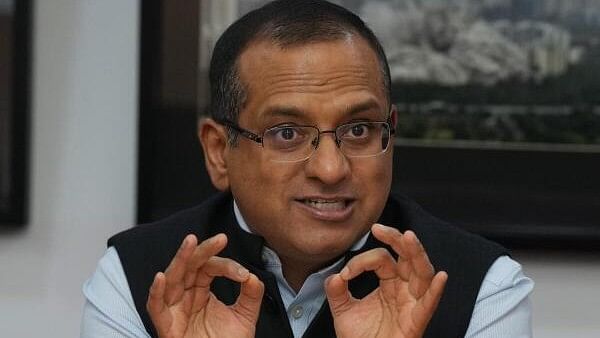
BJP leader and India Foundation founder Shaurya Doval speaks during an interview with PTI, in New Delhi.
Credit: PTI Photo
New Delhi: Any attempts to make changes in textbooks to highlight portions that generate pride about the country's history or geography should not be seen as "saffronisation", according to BJP leader and founder of think-tank India Foundation Shaurya Doval.
He, however, emphasised that the changes should be based on facts.
In an interaction with PTI editors at the agency's headquarters here, Doval said there is no doubt that whatever is there in existing textbooks is not based on hearsay and must be well researched. But if certain facts emerge later and it is thought that those should be taught to students, it should not be seen as "saffronisation", he said.
"For instance Mughal empire finished somewhere around 1700 and in 1857 Britishers came, then someone must have ruled us for the period in between but we have been hearing that we were slaves for over 1,000 years, first by Mughals and then by Britishers. May be India had a resurgence during that period of over 100 years but the moment that thought is suggested, critics say there is saffronisation," he said.
The banker-turned-political thinker noted that it was part of the colonial education system to create people who do not believe in self pride.
"I am not saying the changes should not be fact based but if there are any portions about history or geography of the country that generate pride, why should not they be highlighted. I don't think that is saffronisation," he said.
Doval's comments come amid an ongoing debate on the changes in the National Council of Educational Research and Training (NCERT) textbooks with the opposition accusing the BJP-led NDA government of changing history.
"I am not an educationist but I have been part of the country's education system," Doval said.
The latest deletions in the textbooks include: BJP's 'rath yatra' from Somnath in Gujarat to Ayodhya; the role of kar sevaks; communal violence in the wake of the demolition of the Babri masjid; President's Rule in BJP-ruled states; and the BJP's expression of "regret over the happenings at Ayodhya".
Portions talking about the achievements of Mughal emperors such as Humayun, Shah Jahan, Akbar, Jahangir and Aurangzeb have also been removed.
Asked about his think-thank's role in promoting Indic thoughts and India's culture and traditions, Doval said, "See yoga, ayurveda and millets...these are all part of India's culture and now on global stage. We have never done cultural advocacy as part of India's diplomacy before".
"The idea is not about just taking India's soft power forward but also giving credibility and legitimacy to the country's cultural wisdom and that is where our think tank has also contributed," he said.